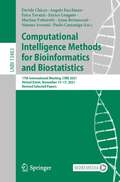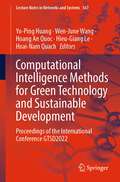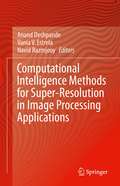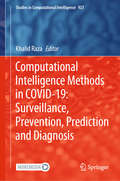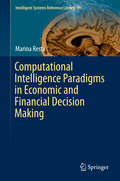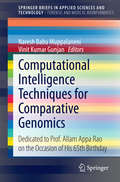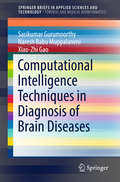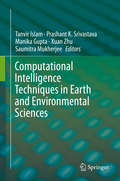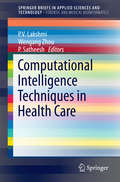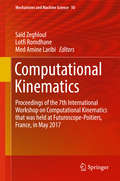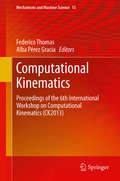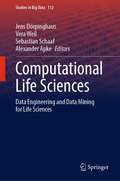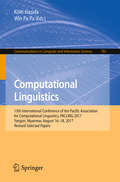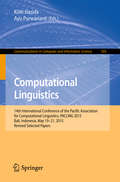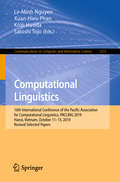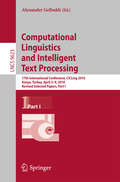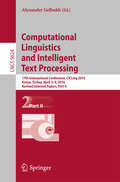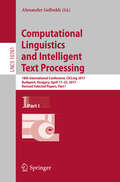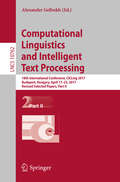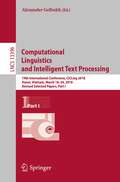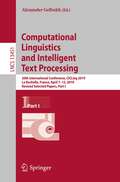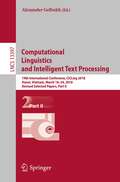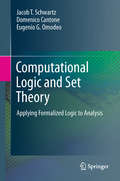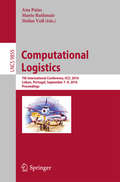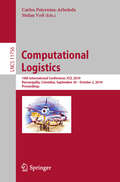- Table View
- List View
Computational Intelligence Methods for Bioinformatics and Biostatistics: 17th International Meeting, CIBB 2021, Virtual Event, November 15–17, 2021, Revised Selected Papers (Lecture Notes in Computer Science #13483)
by Davide Chicco Angelo Facchiano Erica Tavazzi Enrico Longato Martina Vettoretti Anna Bernasconi Simone Avesani Paolo CazzanigaThis book constitutes revised selected papers from the 17th International Meeting on Computational Intelligence Methods for Bioinformatics and Biostatistics, CIBB 2021, which was held virtually during November 15–17, 2021. The 19 papers included in these proceedings were carefully reviewed and selected from 26 submissions, and they focus on bioinformatics, computational biology, health informatics, cheminformatics, biotechnology, biostatistics, and biomedical imaging.
Computational Intelligence Methods for Green Technology and Sustainable Development: Proceedings of the International Conference GTSD2022 (Lecture Notes in Networks and Systems #567)
by Yo-Ping Huang Wen-June Wang Hoang An Quoc Hieu-Giang Le Hoai-Nam QuachThis book provides readers with peer-reviewed research papers presented at the 6th International Conference on Green Technology and Sustainable Development (GTSD) held in Nha Trang City, Vietnam, from July 29 to 30, 2022. The book is original work of researchers from academia and industry focusing on the theme “Green technology and sustainable development in Industrial Revolution 4.0” not only to raise awareness of the vital importance of sustainability in education, technology, and economic development, but also to highlight the essential roles of technology innovation for the green future. The book presents a wide range of research aspects including energy engineering, electric power systems, renewable energy systems, automatic control engineering, robotics, vehicle engineering, material engineering, construction engineering, mechanical engineering, vibrations, computational analysis, numerical investigation, system failure, technological solutions in health care, and so on. Through thorough research basing on both experimental and numerical methods, the authors feature either solutions for existing problems or optimization and improvement for performance of existing methods. The collected research results could be useful alternatives and implications for industry experts, research institutions, universities, and all others who share a common interest in the future global sustainable development.
Computational Intelligence Methods for Super-Resolution in Image Processing Applications
by Anand Deshpande Vania V. Estrela Navid RazmjooyThis book explores the application of deep learning techniques within a particularly difficult computational type of computer vision (CV) problem ─ super-resolution (SR). The authors present and discuss ways to apply computational intelligence (CI) methods to SR. The volume also explores the possibility of using different kinds of CV techniques to develop and enhance the tools/processes related to SR. The application areas covered include biomedical engineering, healthcare applications, medicine, histology, and material science. The book will be a valuable reference for anyone concerned with multiple multimodal images, especially professionals working in remote sensing, nanotechnology and immunology at research institutes, healthcare facilities, biotechnology institutions, agribusiness services, veterinary facilities, and universities.
Computational Intelligence Methods in COVID-19: Surveillance, Prevention, Prediction and Diagnosis (Studies in Computational Intelligence #923)
by Khalid RazaThe novel coronavirus disease 2019 (COVID-19) pandemic has posed a major threat to human life and health. This book is beneficial for interdisciplinary students, researchers, and professionals to understand COVID-19 and how computational intelligence can be used for the purpose of surveillance, control, prevention, prediction, diagnosis, and potential treatment of the disease. The book contains different aspects of COVID-19 that includes fundamental knowledge, epidemic forecast models, surveillance and tracking systems, IoT- and IoMT-based integrated systems for COVID-19, social network analysis systems for COVID-19, radiological images (CT, X-ray) based diagnosis system, and computational intelligence and in silico drug design and drug repurposing methods against COVID-19 patients. The contributing authors of this volume are experts in their fields and they are from various reputed universities and institutions across the world. This volume is a valuable and comprehensive resource for computer and data scientists, epidemiologists, radiologists, doctors, clinicians, pharmaceutical professionals, along with graduate and research students of interdisciplinary and multidisciplinary sciences.
Computational Intelligence Paradigms in Economic and Financial Decision Making (Intelligent Systems Reference Library #99)
by Marina RestaThe book focuses on a set of cutting-edge research techniques, highlighting the potential of soft computing tools in the analysis of economic and financial phenomena and in providing support for the decision-making process. In the first part the textbook presents a comprehensive and self-contained introduction to the field of self-organizing maps, elastic maps and social network analysis tools and provides necessary background material on the topic, including a discussion of more recent developments in the field. In the second part the focus is on practical applications, with particular attention paid to budgeting problems, market simulations, and decision-making processes, and on how such problems can be effectively managed by developing proper methods to automatically detect certain patterns. The book offers a valuable resource for both students and practitioners with an introductory-level college math background.
Computational Intelligence Techniques for Comparative Genomics: Dedicated to Prof. Allam Appa Rao on the Occasion of His 65th Birthday (SpringerBriefs in Applied Sciences and Technology)
by Vinit Kumar Gunjan Naresh Babu MuppalaneniThis Brief highlights Informatics and related techniques to Computer Science Professionals, Engineers, Medical Doctors, Bioinformatics researchers and other interdisciplinary researchers. Chapters include the Bioinformatics of Diabetes and several computational algorithms and statistical analysis approach to effectively study the disorders and possible causes along with medical applications.
Computational Intelligence Techniques in Diagnosis of Brain Diseases (SpringerBriefs in Applied Sciences and Technology)
by Xiao-Zhi Gao Naresh Babu Muppalaneni Sasikumar GurumoorthyThis book highlights a new biomedical signal processing method of extracting a specific underlying signal from possibly noisy multi-channel recordings, and shows that the method is suitable for extracting independent components from the measured electroencephalogram (EEG) signal. The system efficiently extracts memory spindles and is also effective in Alzheimer seizures. Current developments in computer hardware and signal processing have made it possible for EEG signals or "brain waves" to communicate between humans and computers - an area that can be extended for use in this domain.
Computational Intelligence Techniques in Earth and Environmental Sciences
by Saumitra Mukherjee Xuan Zhu Tanvir Islam Prashant K. Srivastava Manika GuptaComputational intelligence techniques have enjoyed growing interest in recent decades among the earth and environmental science research communities for their powerful ability to solve and understand various complex problems and develop novel approaches toward a sustainable earth. This book compiles a collection of recent developments and rigorous applications of computational intelligence in these disciplines. Techniques covered include artificial neural networks, support vector machines, fuzzy logic, decision-making algorithms, supervised and unsupervised classification algorithms, probabilistic computing, hybrid methods and morphic computing. Further topics given treatment in this volume include remote sensing, meteorology, atmospheric and oceanic modeling, climate change, environmental engineering and management, catastrophic natural hazards, air and environmental pollution and water quality. By linking computational intelligence techniques with earth and environmental science oriented problems, this book promotes synergistic activities among scientists and technicians working in areas such as data mining and machine learning. We believe that a diverse group of academics, scientists, environmentalists, meteorologists and computing experts with a common interest in computational intelligence techniques within the earth and environmental sciences will find this book to be of great value.
Computational Intelligence Techniques in Health Care (SpringerBriefs in Applied Sciences and Technology)
by P. V. Lakshmi Wengang Zhou P. SatheeshThis book presentsresearch on emerging computational intelligence techniques and tools, with aparticular focus on newtrends and applications in health care. Healthcare is a multi-faceted domain,which incorporates advanced decision-making, remote monitoring, healthcarelogistics, operational excellence and modern information systems. In recentyears, the use of computationalintelligence methods to address the scale and the complexity of the problems in healthcarehas been investigated. This book discusses various computationalintelligence methods that are implemented in applications in different areas of healthcare. It includes contributions bypractitioners, technology developers and solution providers.
Computational Kinematics: Proceedings of the 7th International Workshop on Computational Kinematics that was held at Futuroscope-Poitiers, France, in May 2017 (Mechanisms and Machine Science #50)
by Saïd Zeghloul Med Amine Laribi Lotfi RomdhaneThis is the proceedings of IFToMM CK 2017, the 7th International Workshop on Computational Kinematics that was held in Futuroscope-Poitiers, France in May 2017. Topics treated include: kinematic design and synthesis, computational geometry in kinematics, motion analysis and synthesis, theory of mechanisms, mechanism design, kinematical analysis of serial and parallel robots, kinematical issues in biomechanics, molecular kinematics, kinematical motion analysis and simulation, geometric constraint solvers, deployable and tensegrity structures, robot motion planning, applications of computational kinematics, education in computational kinematics, and theoretical foundations of kinematics. Kinematics is an exciting area of computational mechanics and plays a central role in a great variety of fields and industrial applications nowadays. Apart from research in pure kinematics, the field deals with problems of practical relevance that need to be solved in an interdisciplinary manner in order for new technologies to develop. The results presented in this book should be of interest for practicing and research engineers as well as Ph. D. students from the fields of mechanical and electrical engineering, computer science, and computer graphics.
Computational Kinematics: Proceedings of the 6th International Workshop on Computational Kinematics (CK2013) (Mechanisms and Machine Science #15)
by Federico Thomas Alba Pérez GraciaComputational kinematics is an enthralling area of science with a rich spectrum of problems at the junction of mechanics, robotics, computer science, mathematics, and computer graphics. The covered topics include design and optimization of cable-driven robots, analysis of parallel manipulators, motion planning, numerical methods for mechanism calibration and optimization, geometric approaches to mechanism analysis and design, synthesis of mechanisms, kinematical issues in biomechanics, construction of novel mechanical devices, as well as detection and treatment of singularities. The results should be of interest for practicing and research engineers as well as Ph. D. students from the fields of mechanical and electrical engineering, computer science, and computer graphics.
Computational Life Sciences: Data Engineering and Data Mining for Life Sciences (Studies in Big Data #112)
by Jens Dörpinghaus Vera Weil Sebastian Schaaf Alexander ApkeThis book broadly covers the given spectrum of disciplines in Computational Life Sciences, transforming it into a strong helping hand for teachers, students, practitioners and researchers. In Life Sciences, problem-solving and data analysis often depend on biological expertise combined with technical skills in order to generate, manage and efficiently analyse big data. These technical skills can easily be enhanced by good theoretical foundations, developed from well-chosen practical examples and inspiring new strategies. This is the innovative approach of Computational Life Sciences-Data Engineering and Data Mining for Life Sciences: We present basic concepts, advanced topics and emerging technologies, introduce algorithm design and programming principles, address data mining and knowledge discovery as well as applications arising from real projects. Chapters are largely independent and often flanked by illustrative examples and practical advise.
Computational Linguistics: 15th International Conference Of The Pacific Association For Computational Linguistics, Pacling 2017, Yangon, Myanmar, August 16-18, 2017, Revised Selected Papers (Communications In Computer And Information Science #781)
by Kôiti Hasida Win Pa PaThis book constitutes the refereed proceedings of the 15th International Conference of the Pacific Association for Computational Linguistics, PACLING 2017, held in Yangon, Myanmar, in August 2017.The 28 revised full papers presented were carefully reviewed and selected from 50 submissions. The papers are organized in topical sections on semantics and semantic analysis; statistical machine translation; corpora and corpus-based language processing; syntax and syntactic analysis; document classification; information extraction and text mining; text summarization; text and message understanding; automatic speech recognition; spoken language and dialogue; speech pathology; speech analysis.
Computational Linguistics: 14th International Conference of the Pacific Association for Computational Linguistics, PACLING 2015, Bali, Indonesia, May 19-21, 2015, Revised Selected Papers (Communications in Computer and Information Science #593)
by Kôiti Hasida Ayu PurwariantiThis bookconstitutes the refereed proceedings of the 14th International Conference of the PacificAssociation for Computational Linguistics, PACLING 2015, held in Bali,Indonesia, in May 2015. The 18revised full papers presented were carefully reviewed and selected from 45papers. The papers are organized around the following topics: syntax andsyntactic analysis; semantics and semantic analysis; spoken language anddialogue; corpora and corpus-based language processing; text and messageunderstanding; information extraction and text mining; information retrievaland question answering; language learning; machine translation.
Computational Linguistics: 16th International Conference of the Pacific Association for Computational Linguistics, PACLING 2019, Hanoi, Vietnam, October 11–13, 2019, Revised Selected Papers (Communications in Computer and Information Science #1215)
by Le-Minh Nguyen Xuan-Hieu Phan Kôiti Hasida Satoshi TojoThis book constitutes the refereed proceedings of the 16th International Conference of the Pacific Association for Computational Linguistics, PACLING 2019, held in Hanoi, Vietnam, in October 2019. The 28 full papers and 14 short papers presented were carefully reviewed and selected from 70 submissions. The papers are organized in topical sections on text summarization; relation and word embedding; machine translation; text classification; web analyzing; question and answering, dialog analyzing; speech and emotion analyzing; parsing and segmentation; information extraction; and grammar error and plagiarism detection.
Computational Linguistics and Intelligent Text Processing: 16th International Conference, Cicling 2015, Cairo, Egypt, April 14-20, 2015, Proceedings, Part I (Lecture Notes in Computer Science #9041)
by Alexander GelbukhThe two-volume set LNCS 9623 + 9624 constitutes revised selected papers from the CICLing 2016 conference which took place in Konya, Turkey, in April 2016. The total of 89 papers presented in the two volumes was carefully reviewed and selected from 298 submissions. The book also contains 4 invited papers and a memorial paper on Adam Kilgarriff’s Legacy to Computational Linguistics. The papers are organized in the following topical sections: Part I: In memoriam of Adam Kilgarriff; general formalisms; embeddings, language modeling, and sequence labeling; lexical resources and terminology extraction; morphology and part-of-speech tagging; syntax and chunking; named entity recognition; word sense disambiguation and anaphora resolution; semantics, discourse, and dialog. Part II: machine translation and multilingualism; sentiment analysis, opinion mining, subjectivity, and social media; text classification and categorization; information extraction; and applications.
Computational Linguistics and Intelligent Text Processing: 16th International Conference, Cicling 2015, Cairo, Egypt, April 14-20, 2015, Proceedings, Part I (Lecture Notes in Computer Science #9041)
by Alexander GelbukhThe two-volume set LNCS 9623 + 9624 constitutes revised selected papers from the CICLing 2016 conference which took place in Konya, Turkey, in April 2016. The total of 89 papers presented in the two volumes was carefully reviewed and selected from 298 submissions. The book also contains 4 invited papers and a memorial paper on Adam Kilgarriff’s Legacy to Computational Linguistics. The papers are organized in the following topical sections: Part I: In memoriam of Adam Kilgarriff; general formalisms; embeddings, language modeling, and sequence labeling; lexical resources and terminology extraction; morphology and part-of-speech tagging; syntax and chunking; named entity recognition; word sense disambiguation and anaphora resolution; semantics, discourse, and dialog. Part II: machine translation and multilingualism; sentiment analysis, opinion mining, subjectivity, and social media; text classification and categorization; information extraction; and applications.
Computational Linguistics and Intelligent Text Processing: 18th International Conference, CICLing 2017, Budapest, Hungary, April 17–23, 2017, Revised Selected Papers, Part I (Lecture Notes in Computer Science #10761)
by Alexander GelbukhThe two-volume set LNCS 10761 + 10762 constitutes revised selected papers from the CICLing 2017 conference which took place in Budapest, Hungary, in April 2017. The total of 90 papers presented in the two volumes was carefully reviewed and selected from numerous submissions. In addition, the proceedings contain 4 invited papers.The papers are organized in the following topical sections:Part I: general; morphology and text segmentation; syntax and parsing; word sense disambiguation; reference and coreference resolution; named entity recognition; semantics and text similarity; information extraction; speech recognition; applications to linguistics and the humanities. Part II: sentiment analysis; opinion mining; author profiling and authorship attribution; social network analysis; machine translation; text summarization; information retrieval and text classification; practical applications.
Computational Linguistics and Intelligent Text Processing: 18th International Conference, CICLing 2017, Budapest, Hungary, April 17–23, 2017, Revised Selected Papers, Part II (Lecture Notes in Computer Science #10762)
by Alexander GelbukhThe two-volume set LNCS 10761 + 10762 constitutes revised selected papers from the CICLing 2017 conference which took place in Budapest, Hungary, in April 2017. The total of 90 papers presented in the two volumes was carefully reviewed and selected from numerous submissions. In addition, the proceedings contain 4 invited papers.The papers are organized in the following topical sections:Part I: general; morphology and text segmentation; syntax and parsing; word sense disambiguation; reference and coreference resolution; named entity recognition; semantics and text similarity; information extraction; speech recognition; applications to linguistics and the humanities. Part II: sentiment analysis; opinion mining; author profiling and authorship attribution; social network analysis; machine translation; text summarization; information retrieval and text classification; practical applications.
Computational Linguistics and Intelligent Text Processing: 19th International Conference, CICLing 2018, Hanoi, Vietnam, March 18–24, 2018, Revised Selected Papers, Part I (Lecture Notes in Computer Science #13396)
by Alexander GelbukhThe two-volume set LNCS 13396 and 13397 constitutes revised selected papers from the CICLing 2018 conference which took place in Hanoi, Vietnam, in March 2018.The total of 68 papers presented in the two volumes was carefully reviewed and selected from 181 submissions. The focus of the conference was on following topics such as computational linguistics and intelligent text and speech processing and others. The papers are organized in the following topical sections: General, Author profiling and authorship attribution, social network analysis, Information retrieval, information extraction, Lexical resources, Machine translation, Morphology, syntax, Semantics and text similarity, Sentiment analysis, Syntax and parsing, Text categorization and clustering, Text generation, and Text mining.
Computational Linguistics and Intelligent Text Processing: 20th International Conference, CICLing 2019, La Rochelle, France, April 7–13, 2019, Revised Selected Papers, Part I (Lecture Notes in Computer Science #13451)
by Alexander GelbukhThe two-volume set LNCS 13451 and 13452 constitutes revised selected papers from the CICLing 2019 conference which took place in La Rochelle, France, April 2019.The total of 95 papers presented in the two volumes was carefully reviewed and selected from 335 submissions. The book also contains 3 invited papers. The papers are organized in the following topical sections: General, Information extraction, Information retrieval, Language modeling, Lexical resources, Machine translation, Morphology, sintax, parsing, Name entity recognition, Semantics and text similarity, Sentiment analysis, Speech processing, Text categorization, Text generation, and Text mining.
Computational Linguistics and Intelligent Text Processing: 19th International Conference, CICLing 2018, Hanoi, Vietnam, March 18–24, 2018, Revised Selected Papers, Part II (Lecture Notes in Computer Science #13397)
by Alexander GelbukhThe two-volume set LNCS 13396 and 13397 constitutes revised selected papers from the CICLing 2018 conference which took place in Hanoi, Vietnam, in March 2018.The total of 68 papers presented in the two volumes was carefully reviewed and selected from 181 submissions. The focus of the conference was on following topics such as computational linguistics and intelligent text and speech processing and others. The papers are organized in the following topical sections: General, Author profiling and authorship attribution, social network analysis, Information retrieval, information extraction, Lexical resources, Machine translation, Morphology, syntax, Semantics and text similarity, Sentiment analysis, Syntax and parsing, Text categorization and clustering, Text generation, and Text mining.
Computational Logic and Set Theory: Applying Formalized Logic to Analysis (Texts in Computer Science)
by Martin Davis Domenico Cantone Jacob T. Schwartz Eugenio G. OmodeoThis must-read text presents the pioneering work of the late Professor Jacob (Jack) T. Schwartz on computational logic and set theory and its application to proof verification techniques, culminating in the ÆtnaNova system, a prototype computer program designed to verify the correctness of mathematical proofs presented in the language of set theory. Topics and features: describes in depth how a specific first-order theory can be exploited to model and carry out reasoning in branches of computer science and mathematics; presents an unique system for automated proof verification in large-scale software systems; integrates important proof-engineering issues, reflecting the goals of large-scale verifiers; includes an appendix showing formalized proofs of ordinals, of various properties of the transitive closure operation, of finite and transfinite induction principles, and of Zorn's lemma.
Computational Logistics: 7th International Conference, ICCL 2016, Lisbon, Portugal, September 7-9, 2016, Proceedings (Lecture Notes in Computer Science #9855)
by Ana Paias Mario Ruthmair Stefan VoßThis book constitutes the refereed proceedings of the 7th International Conference on Computational Logistics, ICCL 2016, held in Lisbon, Portugal, in September 2016. The 29 papers presented in this volume were carefully reviewed and selected for inclusion in the book. They are organized in topical sections entitled: container terminals and maritime transportation; intermodal transport; location and routing; (general) logistics and supply chain management.
Computational Logistics: 10th International Conference, ICCL 2019, Barranquilla, Colombia, September 30 – October 2, 2019, Proceedings (Lecture Notes in Computer Science #11756)
by Carlos Paternina-Arboleda Stefan VoßThis book constitutes the proceedings of the 10th International Conference on Computational Logistics, ICCL 2019, held in Barranquilla, Colombia, in September/October 2019. The 27 papers included in this book were carefully reviewed and selected from 49 submissions. They were organized in topical sections named: freight transportation and urban logistics; maritime and port logistics; vehicle routing problems; network design and distribution problems; and selected topics in decision support systems and ICT tools.
